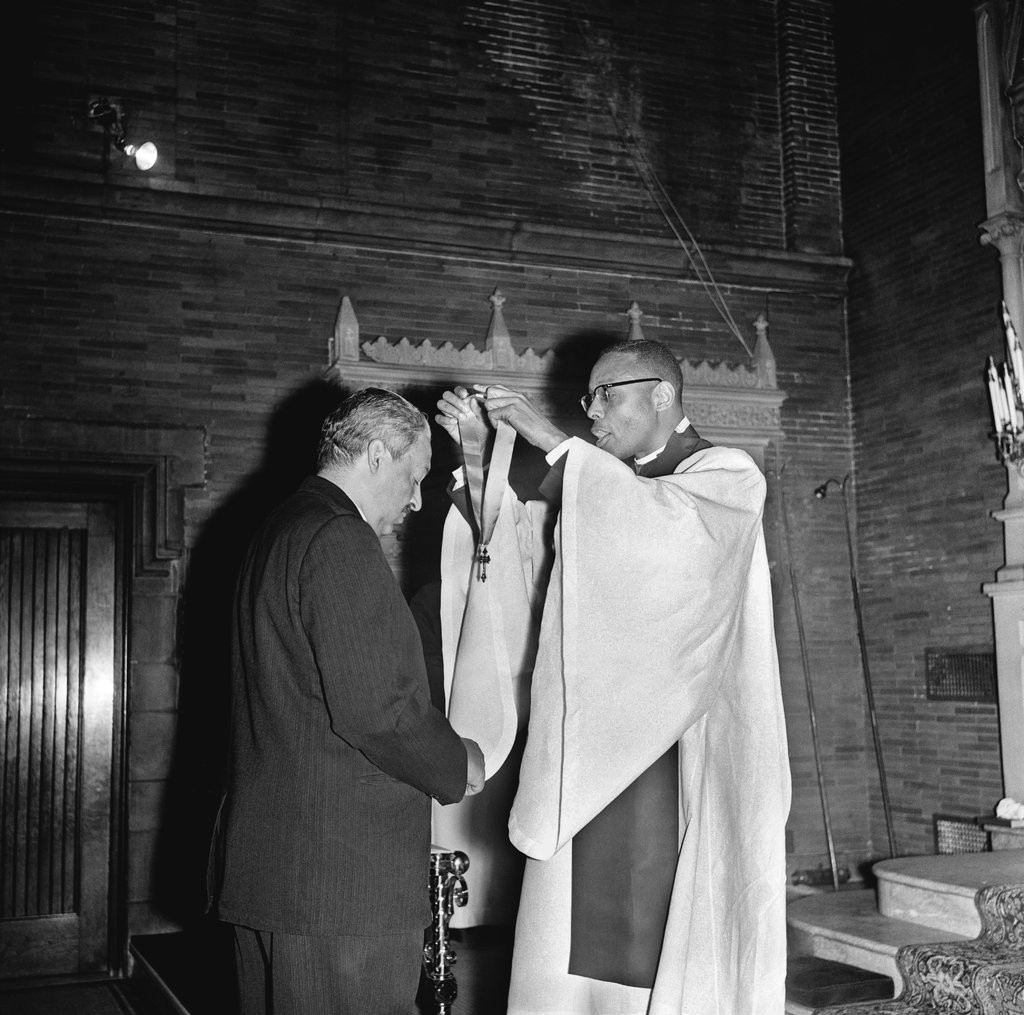The New York Times, during Black History Month, is publishing images from its archives that have never been published before, and today’s captured a bit of Episcopal history as well.
Thurgood Marshall was a lawyer of heroic imagination, who led the team that brought school desegregation to the Supreme Court, winning an end to separate but equal. In 1967, he became the country’s first black Supreme Court justice.
But five years before that, on the Sunday after Thanksgiving in 1962, he made his way to St. Philip’s Protestant Episcopal Church in Harlem, where he was a vestryman, and bowed his head to receive the St. Philip’s Rector’s Award from the Rev. Dr. M. Moran Weston.
To outsiders perhaps, it was a minor accolade for Mr. Marshall, then a federal appeals court judge. It went unmentioned in Justice Marshall’s lengthy Times obituary. But the quiet humility he displays here in a photograph (never published until now) reveals just how much his faith, and church, provided him with spiritual strength.
The priest pictured, the Reverend Dr. Weston, was an activist, social worker, author and scholar who passed away in 2002 at the age of 91, as reported by The New York Times in ’02. The son and grandson of Episcopal priests, Weston founded the Carver Federal Savings Bank.
From his biography in the African American Registry:
His career as a social activist and priest was centered in that city. During the 1930s he studied at the General Theological Seminary the Divinity School of the Protestant Episcopal Church in Philadelphia and the Union Theological Seminary in New York City. He received the Bachelor of Divinity degree in 1934. He studied at the New School for Social Research 1935-37 and received his Ph. D. from Columbia University in social history in 1954. During these years Weston participated in several student and community organizations that supported Negro interracial youth civic and labor causes. He worked as a caseworker and supervisor for the New York City Department of Social Welfare from 1935-41.
In 1941 he began writing his column Labor Forum that appeared in The Amsterdam News for almost ten years. From the 1950s through the 1990s Weston served on many boards including the NAACP Legal Defense Fund, Leake and Watts Children’s Home, the New York City Mission Society, the Community Service Council of Greater New York, Columbia University, the Phelps-Stokes Fund, Mt. Sinai Medical School and Hospital, St. Augustine’s College Raleigh NC, C. A. R. E., the Urban League of Westchester County the Foreign Relations Association, the Cathedral of St. John the Divine, the Harlem Cultural Council and the Schomburg Corporation.
Weston’s scholarly accomplishments include a position as a tenured Professor of Social History in the Department of African and African-American Studies at the State University of New York at Albany from 1968 to 1977 and as a Visiting Professor at the University of Nigeria in 1978. Other publications include Episcopalians at Work in the World 1952, his dissertation, Social Policy of the Episcopalian Church in the Twentieth Century 1964, Who Is This Jesus? 1973 and many articles and pamphlets.
And from the Archives of The Episcopal Church:
“Like the setting of a worship service, life itself should have beauty, order and dignity. I become concerned if the neighborhood is ugly, run down, dirty and unattractive.”
Father Weston summed up his philosophy of a life’s work in the ideas of beauty, order and dignity.

